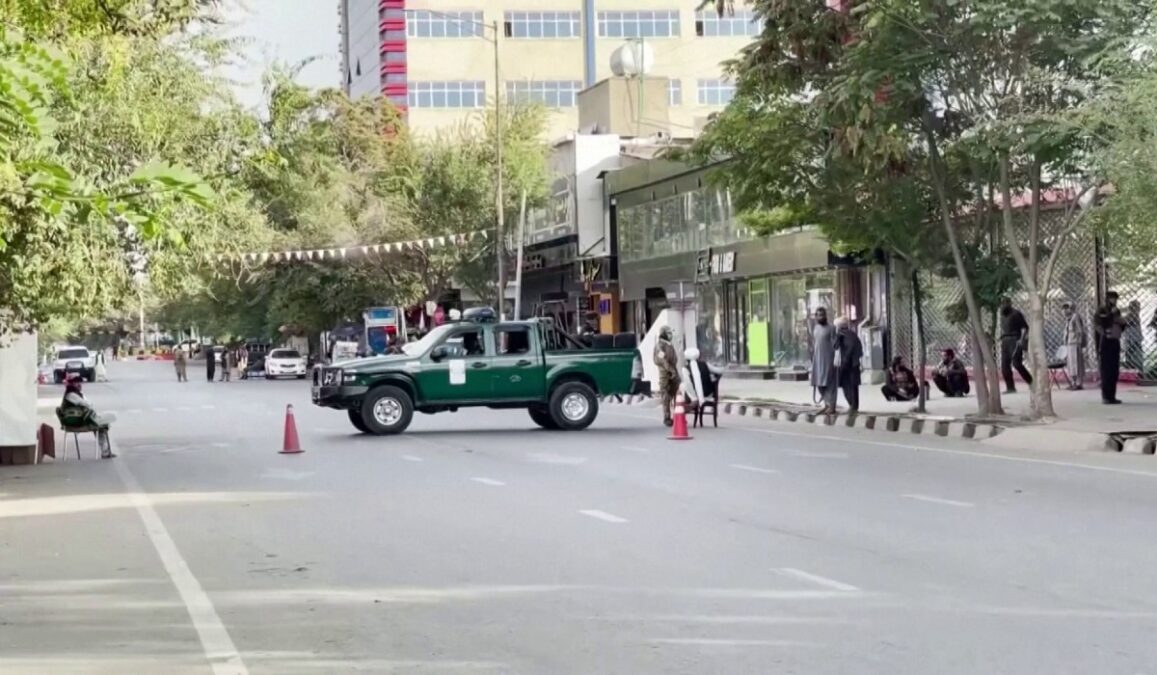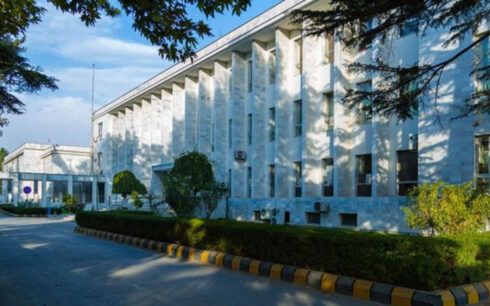Daesh has claimed responsibility for five attacks in Kabul and one in the northern Balkh province of Afghanistan in under two months.
On Wednesday, a suicide bomber detonated his explosives among the employees of the Taliban’s foreign ministry in Kabul at 3:38 pm.
A senior official of the ministry confirmed to Amu TV that 13 people had been killed and 36 others wounded in the incident.
The Emergency Hospital in Kabul meanwhile said in a tweet that it had received more than 40 people who had sustained injuries in the blast.
Reuters citing sources from the Taliban-run ministry of information and culture reported that the explosion left at least 20 dead.
About nine hours after the attack, the DAESH (Daesh) militant group issued a statement and claimed responsibility for the attack. The statement said that the purpose of the suicide attack was to “disrupt a meeting between the Taliban and foreign diplomats.”
A source familiar with the matter told Amu TV that shortly before the blast a delegation from UNAMA, led by UN envoy Markus Potzel, was present at the ministry to meet with Sher Mohammad Abbas Stanikzai, the political deputy of the Taliban’s foreign ministry.
According to the source, the incident happened in front of the foreign ministry 15 minutes after the UNAMA delegation and five minutes after Stanikzai left the compound.
Naeem Powish, the acting ambassador to Austria, said around 5,000 ISIS fighters were released from Afghanistan’s jails following the collapse of the Republic government and that the group would carry out more attacks.
“The Taliban are unable to protect people’s lives, public places, and government facilities, and thwart DAESH’s attacks. At the same time, the Taliban are removing security capabilities and security walls from Kabul to show the world that they can maintain security.”
Burna Karimi, the former ambassador of Afghanistan in Canada, said that the Taliban proved that they made “false” promises to the people about maintaining security.
“I think it is possible that this issue (attack) has a link to yesterday’s remarks by Abbas Stanikzai and his reaction to the leader of this group’s order about closing universities to girls, and a faction or group of Taliban in response to these words of Mr. Stankzai could have planned and conducted the attack under the name of Daesh.”
A source familiar with the matter, however, stated that the Taliban officials use a separate gate for their movements at the ministry and it seems unlikely that Stankzai had been the target of this attack.
According to him, the employees and civilians use the public gate, where the explosion happened on Wednesday.
In the last 50 days, Daesh has conducted six attacks in Kabul and Balkh provinces to show its bold presence under Taliban rule in Afghanistan. The militant group organized attacks on the Taliban-run ministry of foreign affairs, the Kabul military airport, the Pakistani embassy in Kabul, a hotel where Chinese nationals were stationed, and a mosque inside Gulbuddin Hekmatyar’s office.
Balkh attack
In early December 2022, a blast targeted a vehicle carrying technical employees of Mawlana Jalaluddin Balkhi Airport in Mazar-e-Sharif of northern Balkh province.
Two people were killed and six others wounded in the attack, which was claimed by DAESH.
Attack on Kabul military airport
On January 1, 2023, a deadly suicide explosion happened at a Taliban checkpoint outside Kabul airport. According to reports, 14 people were killed and 18 others were injured in the attack. The Taliban confirmed there were casualties but did not provide numbers. DAESH claimed responsibility for the attack.
Attack on hotel accommodating Chinese nationals
On December 12, 2022, the DAESH militants stormed a hotel in Kabul where Chinese nationals were living. China’s Foreign Ministry confirmed that five Chinese were wounded in the attack. Following the attack, China instructed its citizens to leave Afghanistan as soon as possible.
The attack happened a day after the Chinese Ambassador to Kabul had urged the Taliban officials to boost security measures to protect Chinese nationals in Afghanistan.
Attack on Pakistani Charge d’affaires in Kabul
On December 2, 2022, two assailants opened fire on Pakistan’s Charge d’affaires in Kabul Ubaidur Rehman Nizamani while he was walking inside the embassy’s compound.
Nizamani sustained a minor injury in the attack and four days after the incident he left Kabul for Islamabad. He has yet to return to Afghanistan.
Attack on Gulbuddin Hekmatyar
A blast happened in front of a mosque inside Hizb-e-Islami leader Gulbuddin Hekmatyar’s office on December 2, 2022.
According to reports, two attackers tried to enter Hekmatyar’s office after an explosive-laden vehicle was detonated close to his office. After the bombing, Hekmatyar said that suicide attackers opened fire on people, killing one of his guards and injuring two others.
Hekmatyar added that he survived the attack after the two assailants were shot dead by his guards.
Hekmatyar, who decided to stay in Kabul after the Taliban takeover, delivers a speech every week during Friday prayers.
In his sermon during Friday prayers on December 16 last year, he accused the former Afghan government and a number of foreign countries of organizing attacks on his office, on Pakistan’s ambassador, and the Logan hotel in Kabul where Chinese nationals were staying.
Rahmatullah Nabil, the former head of Afghanistan’s national security, told Amu: “Various groups have moved into the north of Afghanistan. Groups that follow an interest in foreign and regional countries. Unfortunately, Afghanistan is becoming [the Afghanistan version of North Waziristan] and this has caused an increase in concerns among regional countries,
“The group has organized three attacks in Kabul and Balkh in less than eleven days. Following the attack, the Taliban face a big security challenge in the coming year and a different stance toward [developments in Afghanistan] compared to last year,” he said.
Daesh has claimed responsibility for all six attacks. The attacks indicate a severe change in the relations of the Taliban with the terrorist group.





